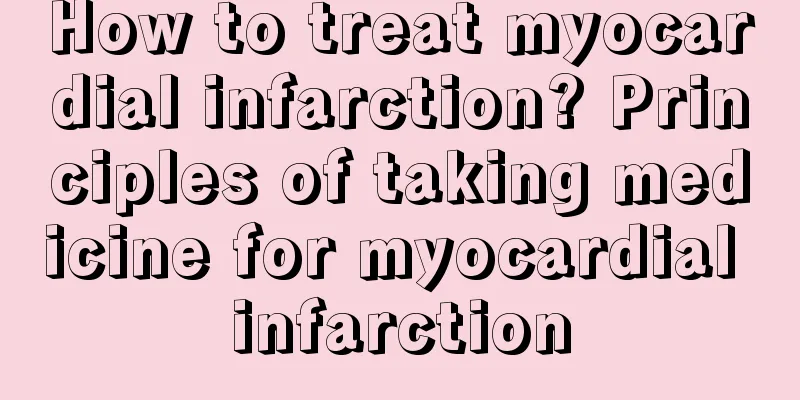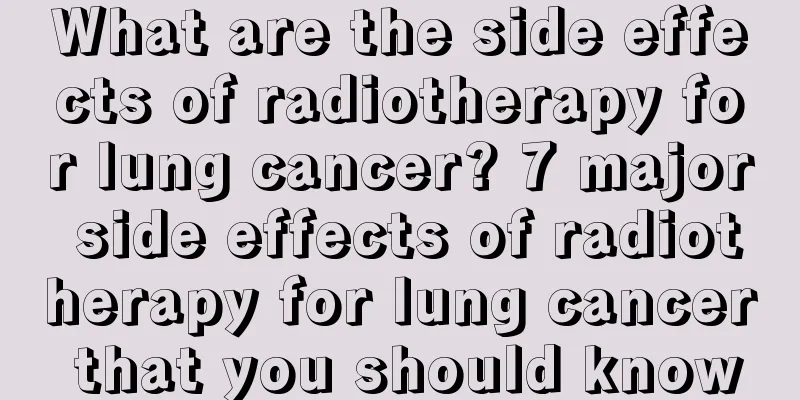How to treat myocardial infarction? Principles of taking medicine for myocardial infarction

|
Myocardial infarction threatens the life safety of the elderly, and the mortality rate is high if not treated in time. Early symptoms in patients with myocardial infarction often include angina pectoris, chest tightness, palpitations, shortness of breath, or unexplained breathing difficulties. So what medicine should you take when these symptoms appear? Experts say that because time is particularly critical in the treatment of myocardial infarction, when a myocardial infarction is suspected, you should call the emergency number immediately, and at the same time, you need to lie flat to buy time for emergency treatment. Pay attention to the early symptoms of myocardial infarction 1. Angina attacks are more frequent than before, the pain lasts longer, the pain is more severe, and angina can occur even with slight activity or even at rest. Nitroglycerin has little effect and is often accompanied by sweating. Patients become restless when the pain attacks. 2. Chest tightness often occurs together with angina pectoris, and palpitations and shortness of breath may also occur during activities. 3. Sudden onset of unexplained symptoms of acute left heart failure such as dyspnea, cough, and foamy sputum. 4. Sometimes patients feel anxious and short of breath, and their pulse is irregular when touched. This symptom may occur frequently. 5. Fatigue and weakness. Cold symptoms or gastrointestinal symptoms such as lack of energy, drowsiness, irritability, dizziness, nausea, vomiting or diarrhea. 6. There is no discomfort such as precordial pain, but symptoms include toothache, stomach discomfort, and swelling and pain in the left shoulder. Patients with a history of coronary heart disease must be vigilant and never be careless. Once they find something wrong, it is best to lie down and observe. If there is no relief within a short period of time, and the symptoms worsen further, and symptoms such as angina pectoris and profuse sweating also appear, then do not delay and go to the hospital for treatment immediately. Going to hospital immediately is more important than taking medicine. Once you suspect you have a heart attack, the most important thing is to call for help, dial 120 and go to the hospital. Please note that you must lie flat at this time, do not move around, and do not walk to the hospital on your own. The benefit of doing this is to reduce the burden on the heart, avoid increasing the area of myocardial infarction, and support the arrival of rescue personnel. Many patients with coronary heart disease carry nitroglycerin with them so that they can take it sublingually at any time in case of angina pectoris. Wang Jingfeng reminded that when taking nitroglycerin, one should pay attention to blood pressure. If blood pressure is low, nitroglycerin should be used with caution. Patients often ask, if I don't want to take nitroglycerin, can I take aspirin or Danshen Pills? In response, Professor Wang Jingfeng said that Danshen Pills currently have no obvious effect in relieving or treating myocardial infarction. As for aspirin, you have to wait for the doctor to come and decide whether you should take it. Because severe chest pain may also be caused by aortic dissection, and aspirin is an anticoagulant, it will increase bleeding. If you take it at this time, it will make the situation worse. When a heart attack occurs, all the patient can do is lie still and wait for rescue. If there is an oxygen device at home or nearby, then the best way to deal with it is to breathe oxygen as soon as possible. Life-saving measures for myocardial infarction Once a heart attack occurs, the doctor will take emergency and necessary treatment measures based on the patient's condition. 1. The most common method is to undergo cardiac intervention surgery. For patients who are eligible for emergency interventional treatment, the doctor will insert a metal guide wire and catheter through the patient's wrist or thigh artery, all the way up into the coronary artery of the heart to reach the blocked area. At this time, the doctor will open the balloon on the catheter to expand the narrowed part of the coronary artery and restore blood flow. This method is already very mature, has significant effects and causes little trauma. 2. If the coronary artery lesions of a myocardial infarction patient are very complex, intervention alone will be difficult to solve the problem. For these patients, doctors will recommend them to undergo heart bypass surgery. That is, use an unobstructed blood vessel (often taken from the patient or an artificial blood vessel) to connect the upstream and downstream of the blocked blood vessel, allowing blood to bypass the narrowed or blocked section of the artery, like building a viaduct, so that the originally ischemic myocardium can get sufficient blood supply. This is currently recognized as the most effective method for treating coronary heart disease. Most patients who do not have the opportunity for intervention or who have poor results from intervention can choose this method. 3. If the nearby hospital does not have the conditions for interventional treatment and bypass surgery, the doctor will also have a stopgap measure, using drug thrombolysis, and choose intravenous drip of thrombolytic drugs to dissolve the blood clot and open up the blood vessels supplying blood to the heart. After a myocardial infarction occurs, the lucky patient will come back from the brink of death with the doctor's timely rescue, but the heart function will often be affected. Some people's hearts will become enlarged after a myocardial infarction, while some people's heart function will be significantly weakened, and they may even die from a heart rupture due to rupture of necrotic myocardium. Therefore, even if a myocardial infarction patient recovers, he or she should not be careless. Prevention is the most important thing. In daily life, remember to quit smoking, eat less oil and salt, maintain smooth bowel movements, take medicine on time, and have regular physical examinations as prescribed by your doctor, especially dynamic electrocardiogram examinations. Don’t think that everything will be fine after a stent is installed, because follow-up treatment and changes in unhealthy lifestyles are the key to saving lives. |
<<: Mania is the root cause of many diseases!
>>: How to treat symptoms of muscle strain?
Recommend
How to treat gastroenteritis, diet adjustment is also needed
The most common type of gastroenteritis is acute....
Sore throat after tooth extraction
Tooth extraction is a common method to solve dent...
Can eating tomatoes prevent prostate cancer? What foods can prevent prostate cancer?
Prostate cancer is one of the most terrible disea...
What nutritional supplements should be given to patients with fractures
It is a rather difficult matter to decide what gi...
What's the matter with fish scales on the calves
The presence of scales on the calves is mostly ca...
A good way to get rid of acne: white vinegar
White vinegar is a common seasoning in households...
Why do my legs hurt when I wake up from sleep?
Everyone needs sleep. Only by ensuring the time a...
What are the most typical characteristics of fibroids?
What are the most typical characteristics of fibr...
Analysis of the cause of endometrial cancer
Cancer experts at the Oncology Hospital pointed o...
How to care for lymphoma during pregnancy
Malignant lymphoma generally does not transfer to...
What is the reason for blisters caused by cupping
Treating diseases through cupping has always been...
Which hospital is good for treating bile duct cancer
Due to various reasons, in modern society, cancer...
The skin is red and swollen after applying the band-aid
Some people will still feel their skin becoming r...
The difference between formula milk and pure milk
There are many formula milk products on the marke...
What to do if there are stones in the kidney
It is well known that kidney stones are a very pa...









